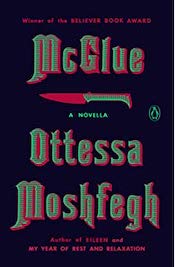Unlikable and unloved

At the beginning of this year, Penguin re-released Otessa Moshfegh's debut novella McGlue. Though the book earned a certain level of fame when it was originally released by a small press in 2014 — it won a Believer Book Award, for one thing — this will likely be many readers' first encounter with McGlue. Moshfegh is now the famed author of the novels Eileen and My Year of Rest and Relaxation and she's developed a significant following.
Those readers are in for a treat, so long as they enjoy unlikable narrators. McGlue, the main character in McGlue, is a reprobate — an uncouth and hateful sailor who, even in the year 1851, is too uncivilized for the sailors he works with.
When McGlue opens, McGlue is in the hold for murder. He's told that in a drunken state he killed his best friend. McGlue is a drunk — he's almost never sober, in fact — and he thinks the charges are probably right.
This is a journey into the head of a very, very bad man. McGlue only feels comfortable when things are wrong. McGlue finds solace when his ship is being tossed at sea:
The ship tilts and rain spills in through the window onto the cot. I get up and drag the cot up against the door. This kind of dizzy makes sense when I walk. The piss and shit bucket I wedge in the corner. I'd like a smoke. I tip the cot to get the water off and lay back down. This is like high seas. The best part. I close my eyes, let the room spin.
Moshfegh juxtaposes McGlue's savagery against that of the world. Where he's being tried, in the town of Salem, Massachusetts, the witch trials have never truly been recognized as the horror that they are. Good men tortured and killed women in the name of religious fervor. But McGlue is unrepentant — in fact, when McGlue is violent and horny and hateful, he's enjoying himself. He's having the time of his life. That, to everyone around him, is the real crime.
Above the altar a wooden man hung magically bleeding, his head bowed and face hurt but not unhappy. That was God, they told me. But I knew that wasn't God. I had the feeling, like alone on the road at night, that there was something watching me, something waiting for me to falter, something just hidden in the shadows waiting to pounce. That was God.
I mean, he's not wrong.
McGlue is a remarkable voice in fiction, a repellant creature who charms with his complete lack of charm. Moshfegh somehow manages coax the reader into feeling some compassion for an unrepentant animal, without softening him one iota. It's some kind of magic trick.
If you like your misanthropic protagonists just a little bit more likable, I'd urge you to check out All Systems Red, the first book in Martha Wells's series of novellas, The Murderbot Diaries. The title character of the series, a security android on a deep-space science mission, accidentally gains awareness.
The Murderbot doesn't really like humans; it wants to watch television and be left alone. But it has some duties — a murderbot's work is never done — and it must keep the team of scientists from discovering that it has become self-aware.
Murderbot isn't as prickly as McGlue; you get the sense that if it found a place away from everyone, it would be perfectly happy to live life unmolested and unmolesting. But the two literary characters could be distant cousins — sailors, of a sort, sworn to perform their duties but failing to achieve even the barest requirements of what we understand it is to be human.